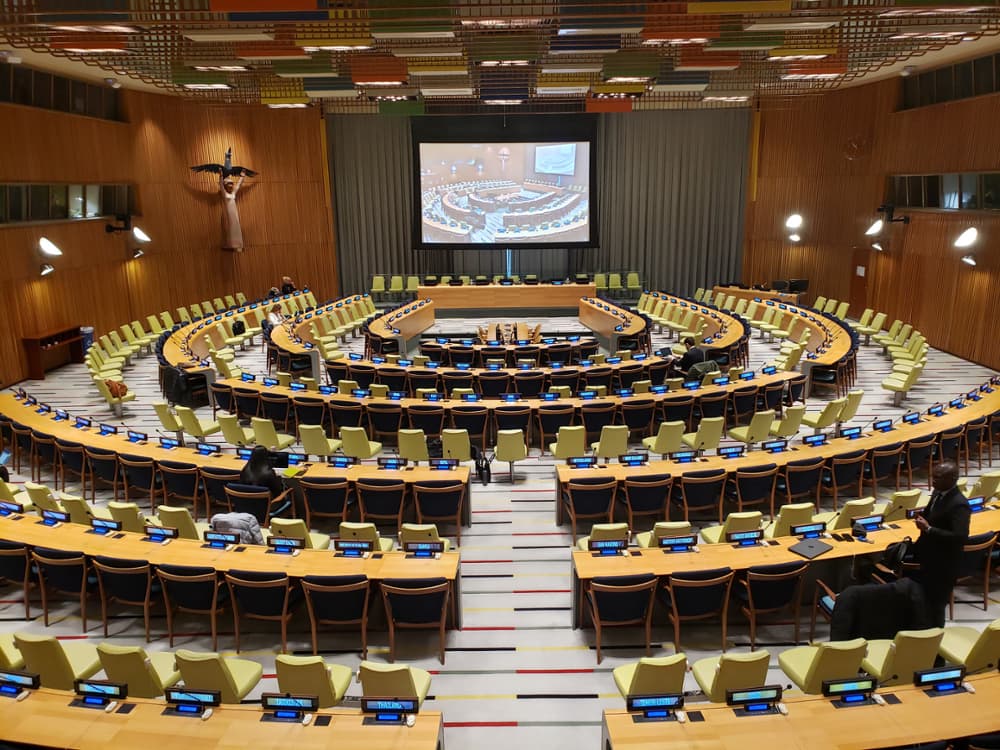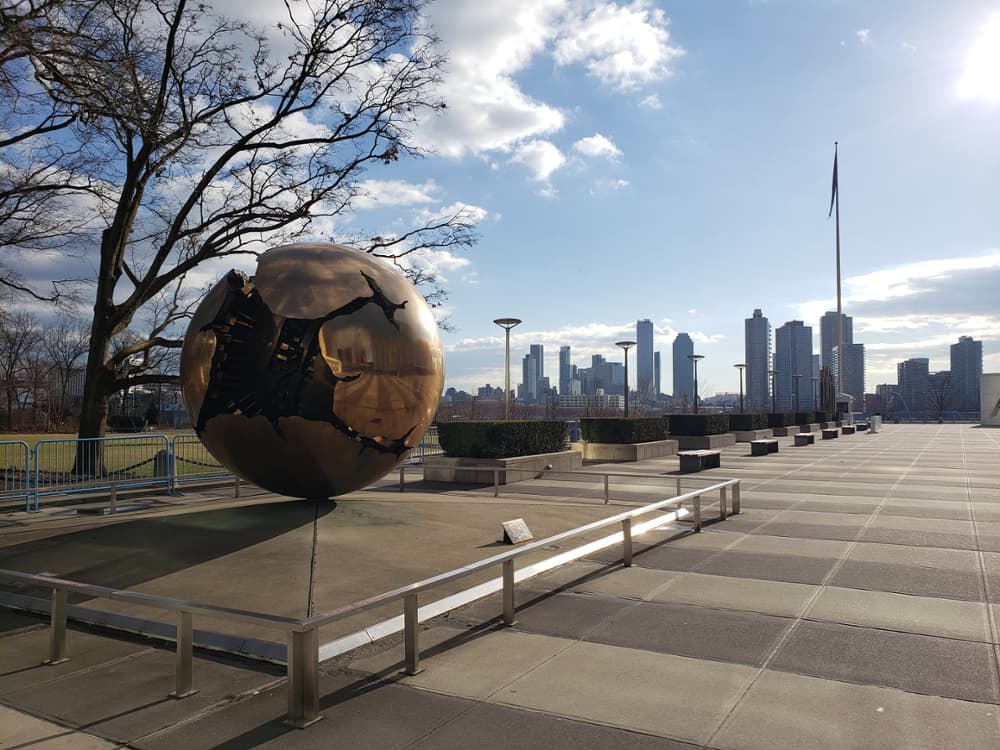Taking Galveston to the UN: Q&A with Dr. Elizabeth Nyman
May 3, 2023
Tweet
By Taylor Bounds, Content Specialist
Earlier this year, Dr. Elizabeth Nyman, a political science professor in the Department of Liberal Studies, joined biologists, environmental scientists and other experts at the United Nations in New York City for negotiations on the Biodiversity Beyond National Jurisdiction Treaty (BBNJ). Bldg. 311 caught up with her to discuss the treaty and her experience with the world's foremost global organization.
What is the BBNJ and why is it important?
The BBNJ is meant to close a loophole in the United Nations Convention on the Law of the Sea (UNCLOS) which was finalized in 1982 and implemented in 1994, so it's either 30 or 40 years old depending on how you're looking at it. At the time, UNCLOS provided a whole bunch of state authority over different areas of the oceans – the territorial sea, exclusive economic zones (EEZs), the continental shelf and the deep seabed. The high seas were open and free for all to use. This worked in the 1980s, when there was this lingering idea that the oceans' resources were inexhaustible, but technology has increased so much that what we can do in the high seas is so different now. Now we need additional protections, and while we've made adjunct treaties since, the BBNJ was really a necessary next step. In 1982, offshore drilling hundreds of miles from the coast was kind of a crazy concept–there were only a handful of operations at the time. Now, it is technologically feasible to have widespread offshore drilling. Though the United States is not a party to the law of the sea, it is customary. We just haven't ratified it through the Senate. It's pretty much unobjectionable as far as international law goes.
While wanting to avoid stepping into the jurisdiction of other UN initiatives, it was decided that there would be four prep cons, four negotiations and finally, a treaty, ending in the spring of 2020. Spoiler alert: we did not finish in the spring of 2020.
The treaty covers four big issues:
The first of these was areas beyond national jurisdiction, or ABNJs, which are high seas waters that aren't under state rule.
Second was a section on environmental impact assessments, basically asking, "What do I need to do to ensure whatever I'm doing won't have some detrimental effect on the environment?"
The third was regarding capacity building and technology transfer. Not all states have the same capabilities as others, so we needed to figure out how to share resources so poorer states that signed on could actually abide by the treaty.
The fourth and final section was about marine genetic resources. Say you find a neat critter that you want to study a little closer: bioprospecting allows you to look at its genetic code and use it to develop what usually ends up being a commercial product. The Human Genome Project didn't even start until the 90s, so obviously UNCLOS doesn't say anything about that. We anticipated this section to be the biggest sticking point, and it was.
You were at the United Nations headquarters in New York City during negotiations. What was that like?
It was so cool. SO. COOL.
You have to be part of an accredited body to attend. I applied as a member of the International Studies Association (ISA) and received approval along with a few of my colleagues.
When I first arrived, I picked up my badge at the UN Pass Bureau Office that let me swipe into the building. After checking in, I was on my own to navigate the UN. My badge allowed me entrance into the public areas of the building as well as more private sections – I spent a lot of my first day exploring and got totally lost. But as it turns out, knowing the locations of all the cafeterias was much to my benefit later on.
As for the negotiations, it was like being locked into a museum. Different groups and organizations brought snacks – at one point, it was like we were all sitting around a campfire. Once the cafeterias closed, we had dinner delivered through the gates. There were only four rooms big enough to hold everyone involved in the negotiation, and the last negotiations were ad hoc, so we just tried to find the biggest empty room available. On Friday, which was supposed to be the last day of negotiations, security set everyone's badge to expire at 11:59 p.m., and they had to be reactivated for Saturday. That was important because you not only had to badge-in to the building – you also had to badge-out.
This is an extraordinary achievement for environmental diplomacy but is currently a draft treaty. What were the biggest hurdles in getting to this point? Do you foresee any challenges with its formal adoption?
Well, 2020 was supposed to be the Inter-Governmental Conference (IGC) 4 - but due to the COVID-19 pandemic, the UN changed its access rules. They tried to make it available to stream online, but as the conference went on and negotiations became more and more private, the format just did not lend itself to online streaming. IGC 5 was last fall, in August. This session was supposed to be the last, but: it was not. The conference decided to simply not end the fifth IGC but suspend it until we could meet again. So we suspended until February when IGC Five (part two) recommenced. After spending the night and early morning hours at the UN, on Saturday morning, I traveled straight from the UN to the airport to return home. The draft treaty wasn't finalized until early morning Sunday.
Eventually, the committee released a draft at around 1:30 a.m. Although we are not authorized to have a sixth IGC, once the draft was finalized, all that's left is approval from the legal team, translation into all six UN languages - French, Spanish, Arabic, Russian, Chinese, and English and its official adoption in June. All signs point towards a successful adoption of the draft.
How will this treaty be enforced?
The BBNJ is just like every other international legal treaty–it's essentially enforced by the honor system. Nobody can make you follow a treaty if you don't want to, and there are some nations that will not sign and ratify this treaty.
What are some other environmental / biodiversity policy issues that will be big in the next few years that affect the marine and maritime landscape?
That's for sure plastics. Plastics have been found everywhere and affect everyone on the planet. About a year ago, the UN signed a resolution to create a plastics pollution treaty and negotiations started soon after. This treaty will be fundamental as we move into the future. Then there are ongoing talks on biodiversity, and sustainable development goals are due for renegotiation. We should see some movement soon.
 Sphere Within Sphere, courtesy of Dr. Elizabeth Nyman
Sphere Within Sphere, courtesy of Dr. Elizabeth Nyman
###
Media contact:More:
Read more about Arts & Humanities
Read more about Business, Law & Society
Read more about Health & Environment
Read more about Science & Technology
Read more about Foundational Sciences
Read more about Liberal Studies
Read more about Marine Biology
Read more about Marine Engineering Technology
Read more about Marine Sciences
Read more about Maritime Administration
Read more about Maritime Transportation